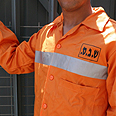
Report: Worrisome findings at Israeli prisons
Justice Ministry’s Department of Public Advocacy visits 33 detention facilities, revealing numerous cases of abuse, suicide attempts, etc. Israel Prison Service says in response improvements are underway
A closer look into Israeli prisons revealed, violence inflicted by wardens, severe punishment, bed-binding for hours, suicide attempts, lack of treatment and rehabilitation frameworks for the prisoners.
These are just a few of the findings unleashed in the 2007 Justice Ministry’s Department of Public Advocacy report on the detainment and imprisonment conditions at the Prison Authority, police, and courts’ detention facilities.
The advocacy’s report compiled the findings on official visits at 33 detention facilities around Israel. Eleven of the correction facilities were under the Prison Authority’s responsibility during the time of the visit, 14 were under the police’s auspices and another eight were under the courts. Since then, the police’s facilities were placed under the Israel Prison Service’s (IPS) control.
The report showed that in one third of the facilities there were complaints about abuse, spurn, and invasive and degrading searches.
For example, at the Ofek Juvenile Prison, the young prisoners reported systematic abuse by the jailers. In one instance, the report described a case in which the inmates hit their cells’ walls and in reaction the jailers sprayed their cells with tear gas and beat them with clubs.
The advocacy noted that during their visit at Ofek, a feeling of fear prevailed amongst the prisoners and most of them were afraid to speak openly. “The use of abuse at the facility has become a matter of routine,” as written in the report. “The severity of the phenomenon worsens when the prisoners are minors.”
According to the document, in light of the severe reports submitted by the advocacy the IPS’ chief called for position changes in the prison’s management.
Heavy crowdedness, bad hygienic conditions
In addition to Ofek, the report discussed the Megiddo, and Shikma Prisons and the Hadarim Detention Center, where complaints of abuse were made.
According to the advocacy the complaints included severe punishment including binding to beds for excessive periods of time.
According to the report, this year at Ofek alone, there were 21 suicide attempts and 19 cases of self-induced harm amongst the young prisoners.
Another topic discussed in the report is the lack of treatment frameworks for the inmates during their time in jail or following their release. One of the purposes of the report was to examine the treatment and rehabilitation framework at the prisoners’ disposal. Here too, a worrisome situation was revealed.
Another issue discussed was the deficiency in the accompaniment and transport of the prisoners. “This year, just like in previous years, complaints were made regarding transport conditions from the various detention facilities to destinations like the courts,” as reported in the document.
The advocacy gave an example from the Hadarim Prison in which many complaints were made about the jolts felt for long hours in the crowded, suffocating, hot and unventilated transport vehicles.
Most of the jails displayed severe defects in their infrastructure. The advocacy claimed that in a large amount of facilities, the physical conditions do not maintain normal levels of human dignity. In their estimation, there is heavy crowdedness, and inferior hygienic and sanitary conditions.
According to the advocacy, the authorities do not make sure to separate between different types of prisoners, as per the law. For example, the Magistrate’s Court in Kfar Saba does not separate between sick and healthy prisoners.
Bothersome gap between policies, actual results
Attorney Gil Shapira of the Public Advocacy said that the essence of the problems has not changed from previous years.“There is a deterioration in the prisoners’ living conditions due to the massive crowdedness in the various facilities,” said Shapira, adding that the proper measures are not taken in order to contain the amount of prisoners in minimal humane conditions.
“There is a bothersome gap between the IPS senior command’s policies and what actually occurs. In addition, there is difficulty instilling values in this area,” said Shapira.
However, he noted that the previous reports have led to a certain improvement of specific procedures, but that the situation is not yet satisfying.
“This is a nationwide problem harming the basic rights of those detained and imprisoned and harming their human dignity,” according to the report.
The report was presented to Supreme Court President Dorit Beinish, Justice Minister Daniel Friedmann,
Internal Security Minister Avi Dichter, Attorney General Menachem Mazuz, IPS Commissioner Chief Warden Benny Kaniak, and Police Commissioner Dudi Cohen.
An IPS official responded by saying, “the Department of Public Advocacy’s report was received, as always, by the IPS and the media simultaneously.
"The report will be studied and everything possible will be done in order to deal with the shortcomings. The IPS invests in renovation, improvement and building new branches and facilities and much is done regarding the staff in order to benefit and improve treatment towards the prisoners at all times.”










